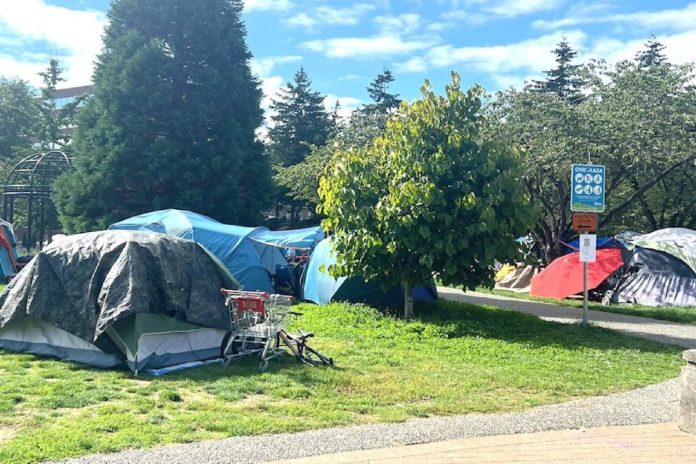On Mar. 8, Drug War Survivors (DWS) held a rally in front of Abbotsford City Hall. Even with the rain, a group from the community showed their support with signs and banners for sustainable solutions concerning the housing and drug crisis in Abbotsford.
The Abbotsford branch of DWS is facilitated through Matsqui-Abbotsford Impact Society as a part of their Street Community sector. The rally brought forward a petition addressing homelessness in Abbotsford, to be addressed by Abbotsford Mayor Ross Siemens, City Council, several members of legislative assembly, MPs Ed Fast and Brad Vis, and Premier David Eby in a letter community members can send to elected officials.
Within their letter, DWS outlined three areas for the municipality of Abbotsford to address. The third item is a rally for more equitable housing policies, stating that housing isn’t purely supply and demand.
“We do not just need more housing — we need more non-market housing (housing not owned for private profit). This includes co-ops, government-owned public housing, and non-profit housing.”
When The Cascade reached out to Mayor Siemens for comment on the rally and the resulting letter, he stated that Abbotsford is taking a “Housing First” approach as a way of aligning with federal and provincial government mandates. The intention of Housing First is to support people who experience chronic homelessness into long-term and stable housing.
Progress was made in April 2024, when the municipality opened 111 temporary shelter spaces. However, DWS claims that this still doesn’t meet the ever growing population experiencing homelessness within Abbotsford. According to statistics from 2023, there are over 406 people in Abbotsford who are homeless — with 81 per cent of those people experiencing chronic homelessness.
According to Mayor Siemens, the power to address the housing crisis isn’t in his hands but that of the provincial government.
“Ultimately, however, it is the responsibility of the Provincial Government to address housing issues, especially where there are gaps in the types of social housing. Unfortunately, by not having those gaps addressed by the Province, municipalities are left to struggle with the on-the-ground impacts with little to no support.”
One of the letter’s other asks is for a designated space for a structured encampment for people experiencing homelessness to congregate — something that could be addressed within municipality by-laws.
“A designated space would not only benefit the street community but improve conditions for all Abbotsford residents. When people have access to washrooms and garbage disposal, the city is cleaner. When people have a designated place to be, they do not need to creatively seek shelter in other parts of town.”
In 2016, Abbotsford Parks by-law changed to allow people experiencing homelessness a place to set up shelters for the night, which the Mayor cited as being an alternative option.
“Our Parks Bylaw permits overnight camping in more than 95% of our 170+ parks to provide immediate relief for those needing shelter while the Province explores options for shelter and housing in our community.”
While the by-law does permit overnight temporary shelter, Section 14b makes it so that people experiencing homelessness can only set up tents or other types of structure that need to be erected after 7 p.m., as they have to be taken down at 9 a.m. the following morning. This means that people experiencing homelessness — dependent on parks as a space for them to exist — are now regulated to being nomads with no security throughout the day.
Brett VanBergen, DWS coordinator and rally organizer, talked to The Cascade about the rally’s second point — the need for expanded harm reduction services in the Lower Mainland.
“We’re also fighting for expanded services to stop the deaths of the toxic drug poisoning crisis. Whether that’s harm reduction, overdose prevention sites, compassion clubs, prescribed alternatives to the toxic supply. [Or] detox.”
The majority of licensed recovery and treatment facilities within Abbotsford require participants to be substance free before enrolling. This means that there aren’t any accessible places for Abbotsford residents to voluntarily go to detox safely. According to VanBergen, there is only one detox centre between Boston Bar and Surrey. Ground Zero Ministries is cited on Abbotsford’s “Reaching Home” page as being a funded project that can help people experiencing homelessness who are looking for detox programs.
From the DWS’s letter, there is a clear call for more support when it comes to people experiencing homelessness — one that will take more creative solutions and a humanistic approach that will help craft a better society for everyone.


